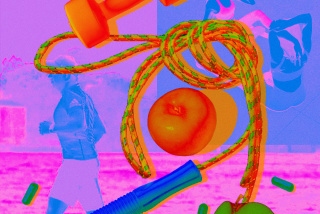Swallow These Claims With a Hefty Dose of Skepticism
- Share via
The average guy in the United States eats 48 hamburgers and 19 pizzas per year. His favorite snack is potato chips. When called upon to fix a romantic dinner, he’s most likely to prepare spaghetti.
I learned all this from reading the April issue of Men’s Health. Though this magazine has been scrutinizing our diets, I’ve spent recent months taking a close look at the diet information we average guys get from this popular magazine and its brethren, such as Men’s Fitness.
These publications dish out plenty of advice about what to eat, and it doesn’t take a PhD in nutrition to know that much of it is on the money. In recent issues, these magazines encouraged men to choose lean sources of protein, such as fish and chicken breast, along with the occasional steak. They also recommend eating lots of fruit, vegetables and whole grains, though they sometimes strain to make these foods seem sexy. One of the oddest comments I came across was “a serving of shredded wheat can propel you through 47 minutes of vigorous lovemaking.” Somehow the thought of eating fiber-y wheat wafers doesn’t put me in the mood for love.
On the other hand, these magazines hit readers over and over with certain messages about food that seem to warrant a second opinion. So I mentioned a few of these common themes to someone who does have a PhD in nutrition: Keith Ayoob, a spokesman for the American Dietetic Assn. Turns out men who rely on these magazines for guidance in the kitchen may sometimes be misled.
For example, I read several diet articles touting an idea that Americans have embraced in recent years: Eating too many carbohydrates makes you fat. Not true, says Ayoob. “Eating too many calories makes you fat,” he explains, a hint of exasperation in his voice. Popular weight-loss plans, such as the Zone and Atkins diets, are based on the belief that bulking up on carbohydrates makes the body store fat. I came across two stories that treated this controversial theory as fact in my informal survey of the men’s mags. “But there’s still no scientific evidence to justify that claim,” says Ayoob.
*
His advice: Watch your appetite for sugary snacks, but there’s no reason to fear other carbs, especially fruit, veggies and whole grains. If these magazines vilify carbs, then they portray protein as a wonder nutrient capable of building massive muscles. The diet plans I found in recent issues advised readers to replace carbohydrates with high levels of protein.
Men who work out several hours a day may need extra protein to feed their growing muscles. Otherwise, there’s no need to worry about your protein intake, says Ayoob. “Most people get more than they need,” he says. “Consuming bucket loads of protein isn’t going to help.” And skip the expensive protein powder supplements sold in health and vitamin stories; Ayoob says they don’t contain anything you can’t get from dairy products, eggs or a handful of soy nuts.
Today’s male health magazines recognize that men have a life outside the gym, however. They often include articles on how to get ahead in the workplace, for example, even recommending meals that will give you sharper wits than the guy in the next cubicle. One nutrition column about so-called smart foods I stumbled across recently listed everything from oatmeal to egg salad.
Ayoob is skeptical. Studies do show that children who eat breakfast do better in school, he concedes. “But that doesn’t mean that any one food will make you smart,” he says. It’s just that an empty belly can drain your brain. “It’s hard to concentrate when your stomach’s growling.”
Finally, anyone who subscribes to a health magazine for men has read that certain foods can “supercharge your sex life!” and give you more mojo than Austin Powers. Here again, various dishes get credit for being aphrodisiacs, though none more often than oysters. One article I read explained that these mollusks are brimming with zinc, a mineral needed to form testosterone, which itself is necessary for healthy erections.
Maybe so, “but that’s only going to help you if you’re zinc-deficient, and most people are not,” says Ayoob. He’s quick to add, however, that while no single food has been identified as a sexual stimulant, some people may simply get turned on by oysters, or any food, for that matter. If so, dig in before a night of passion. Just don’t overdo it. Pigging out makes some people sleepy, after all. “If your plans call for some amore,” quips Ayoob, “you might be better off eating a lighter meal.” In other words, average guys, next time you cook a romantic dinner for your mate, you may want to rethink the spaghetti. Maybe a small bowl of shredded wheat instead?
*
Timothy Gower is the author of “Staying at the Top of Your Game” (Avon Books, 1999). He can be reached by e-mail at tgower@mediaone.net. The Healthy Man runs the second Monday of the month.






